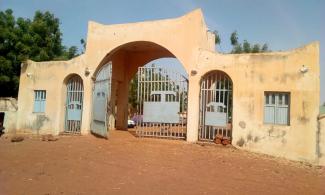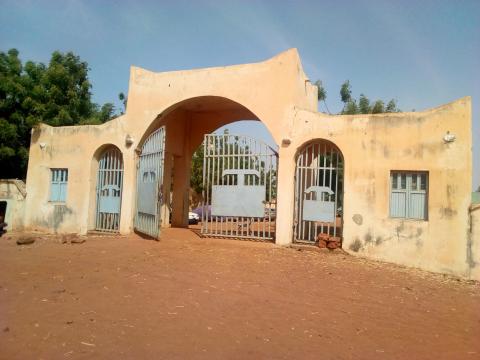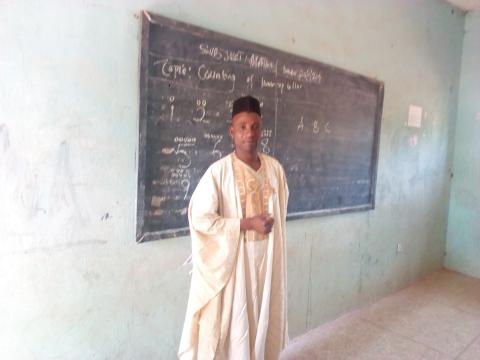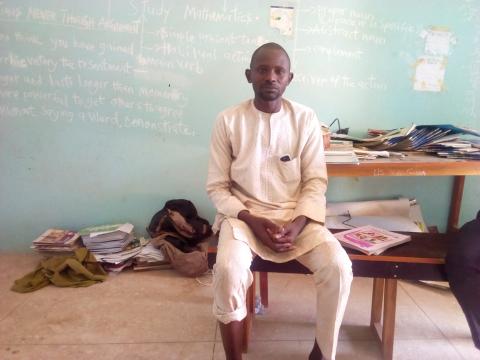
Built to build the future of the itinerant children; for qualitative schooling and proper education, investigation by SaharaReporters reveals that there is no schooling in the multi-million naira Almajiri School in Sokoto state as it is generally supposed by the public. For 11 good working days, in January, Ibrahim Adeyemi visited the two major Almajiri schools in Sokoto and documented his findings.

It is a lip-shattering harmattan morning, on Monday, at exactly 9:45 am; the williwaw-wind assails the journalist left and right, back and front as if to befall him. He has just alighted — from a rack-dangling motorcycle — in front of the Tsangaya School, Gagi in Sokoto state. Since the security man is nowhere to be found, he heads straight to the reception room, where a cluster of cobwebs welcomes his red-watery eyes. The principal is also nowhere to be found and no one knows his whereabouts. But one dark, short man who simply introduces himself as Abubakar leads the newsman to the Vice-Principal's office.
Now, it is already 10:05 am, chewing stick is still roaming in the oral cavity of the Vice-Principal — in his office. At the sight of the visiting reporter, he stiffens his bilabials as if to bestow a consoling kiss on a weeping toddler. But he will not kiss; he only pushes out the remnant of the seemingly stinky spit from his mouth through the proxy window to him. At the entrance of his office, a lineup of men and women understood to be teachers are seen writing attendance. "Rankadede" says a dark woman in ground-touching purdah, waving with smiles on her face at the Vice- Principal.
"Who are you and what do you want?" The Vice-Principal mutters, curiously asking the alien reporter to state his mission in the school, which he does, exponentially and expressively. But Surprisingly, Abubakar cuts in, interpreting — word-for-word — the English spoken by the reporter to the said Vice-Principal. He, the reporter, observes that the man apparently does not understand him. The simple English he speaks seems to be high-falutin phraseologies to the man. So, he directs Abubakar to guide the journalist round the school premises.
Get not lost! This is (Tsangaya) Almajiri Integrated Model Boarding School, situated at Gagi village Sokoto South Local Government Area of Sokoto State. It was the first — among many other multi-million naira Almajiri schools projects in Nigeria. Commissioned on April 10, 2012, by the then President, Goodluck Ebele Jonathan, the school was the first of its kind built by the federal government to provide equal access to qualitative education for the almajiri.
“Federal government has so far constructed 35 of such model schools. States with large populations of Almajiri will have both boarding and day schools.
“Unfortunately, and in spite of the best effort of government, the goal of providing access to quality education has not been fully realised in Nigeria as the North-West geo-political zone alone accounts for almost five million which is over 60 per cent of the total population of Almajiri nationwide,” former President Jonathan asserts, while inaugurating the existence of the school in Sokoto.
According to the United Nations Intervention for Children and Emergency Foundation (UNICEF), "even though primary education is officially free and compulsory, about 10.5 million of the country’s children aged 5-14 years are not in school. Only 61 percent of 6-11 year-olds regularly attend primary school and only 35.6 percent of children aged 36-59 months receive early childhood education.
"In the north of the country, the picture is even bleaker, with a net attendance rate of 53 percent. Getting out-of-school children back into education poses a massive challenge."
As if that is not enough, UNICEF also statistically states that "in north-eastern and north-western states, 29 percent and 35 percent of Muslim children, respectively, receive Qur’anic education, which does not include basic skills such as literacy and numeracy. The government considers children attending such schools to be officially out-of-school."
However, beyond the shoddiness in their world on the streets, another kind of shadiness is meted out on the very few itinerant children who have — in one way or the other — found themselves in the school. Even as you read, what is most disgusting is not the falling structure of the multi-million established facilities in the Sokoto's Almajiri School, but the dominating teachers who are magnates of incompetence and salaries lovers but enemies of services.
In spite of the availability — though ruining — of facilities such as class rooms, computer room, science laboratory, recitation hall, library, language laboratory, dormitories and etcetera, this reporter can accurately report that the system of teaching and learning western education in the school is too poor to be averagely called standard.
Are They Really Schooling?

"Good morning sir," the chaps blaringly say, exchanging pleasantries with the fact-finding journalist courtesy for courtesy. This is Primary one of the Tsaganya School, Sokoto. It is 10:32 am and this is the first subject on the Monday morning, apart from the usual traditional reading and brainstorming on the Quranic symphony.
Hard as it is to believe, the children met in the class room are not far different from those on the street — looking haggard, laggard and clearly not well cared for. The teacher that is supposed to be the children's role model is equally not properly dressed. And, the mathematics teacher cannot even express himself in English; he rather teaches the subject solely in Hausa language — the mother-tongue of the children and confirms that that's the communication lingo, generally in the school.
In class two, the children are left alone; their teachers are nowhere to be found. They've not had any class today thus; the class room is bombarded with the rowdiness of the left-alone students, who have hardly known why they are in school as kids. "Good morning" and other clichéd pleasantries in elementary schools seem to be the only English locutions well understood by the entire students. Speak any other simple English and you will be weakened by their weak responses — if at all any seemingly brilliant pupil can try.

"Lissafi: Kasaru" is the boldly written inscription that welcomes us to class three. This means — as boldly written on the black board — "Mathematics: Fraction." The teacher here looks pell-mell exactly like the pupils, who are apparently disarrayed. None of the students seems to understand what the teacher has taught them; none of them can solve the simple fraction which their lector has been teaching them for over a week now, not even in Hausa language. It is 11:06 and Mathematics is the subject; English Language is supposed to be the first subject of the day but the teacher is not yet around. Later while this reporter interacts with the students, he appears, suddenly. His name is Abdulqadir Bello. "Most of them do not understand English and some of them are moderate," says the English Language teacher, when asked why the students can't speak English or simply understand it.
In class four, ‘Social Studies’ is the subject, Hausa is the language of communication and Fatima Ibrahim, a tall, fair, eye-catchy lady is the teacher here. Fatima claims she mixes the language of communication in variant of English and Hausa but obviously the students only understand the later. While the teacher teaches, the only pupil sighted writing seems to have turned his note book upside down; the primary four pupil writes English as though it is Arabic. The bilious look of the pupils is, this time, antonymous to the gorgeous look of their teacher.
The next class is primary 5; kids are seen kidding around in the class room, there is no teacher with them. The kids proclaim they've had no class for the day. And in class six — the most senior class in the school — the chaps look a bit mature than others, expectedly, but then, they are apparently more unsettled in the class room. The children look very pale and uncared for, overwhelmed by the troubling Sokoto harmattan. While the class is going on here, some men who are understood to be staff of the school are sighted at the back of the class, holding talks, laughing and obviously distracting the pupils.
Meanwhile, before heading forth to see the decaying school facilities, some teachers, including those met earlier in the class rooms are observed chit-chatting under the baobab tree adjacent to the vice-principal's office. It's 12: 28 pm now and the school closes by 1:30pm, yet, no serious schooling has taken place in the said school. Subsequent visitations by this reporter to the school reveal that there is a robust attitudinal tepidity towards teaching and learning in the school.
Behold The School Principal Can't Speak English!

It's strange, but as a matter-of-factly, it's real! The principal of a primary school cannot express himself in the Nigeria's official language — English. A panoramic finding by this reporter reveals that, apart from Hausa, his mother-tongue, and Arabic; the Principal of the Tsangaya Model School located in Gagi can hardly understand or speak the English language.
His name is Malam Husseini Muhammad; at first sight on a Saturday — which is one of the working days of the school — the good-morning-sir courtesy greeting muttered by the reporter to the man receives a go-that-way reaction. The principal instantly directs the journalist to his vice, who, unknown to him, has been met previously on Monday. "Go back to the principal," says the vice in his local parlance. "He's the one to talk to you, not me." But it seems the vice understands that the language of communication — English — is the barrier, he tellingly asks the reporter to "speak either Hausa or Arabic, should the principal cannot speak English." Though, the reporter can speak Arabic and obviously can't communicate in Hausa; he works with a female fixer who does the interpretation.
Back to the principal's office, the journalist introduces himself properly in English, only for him to find out that the man's face is etched with confusion. Notwithstanding, the fixer does the interpretation to him in Hausa — and only then, the conversation begins to flow — while the journalist asks questions in English Language.
In the course of the discussion, the journalist interacts with one of the teachers sighted in the principal's office that teaches Quran recitation and confesses his weakness in English language. The reporter deliberately converses with the teacher in Arabic so as to directly get the attention of the principal, which he does. And the duo, in the Arabic language, communicates fluently. This time, the fixer is lost.
Free School Uniform Monetised

On Friday, predating the Monday that this reporter visits the school, a female fellow poses like a parent who wants to enroll her son in the school — to have a firsthand mind's eye on the ongoing rots in the school system and the processes of enrolling a child in the said school.
In a full-head-to-tow niqab, she finds her way into the Principal's office. "I want to bring my son to this school, so I'm here to ask for the requirements," says the lady to the Principal in a Sokoto accented Hausa lingo that suits her poseur. "You have to meet the secretary of your local government; he will give you a note which you will bring to me. After that, you have to pay for his uniform, only the registration fee is free," the Principal replies, compendiously explaining the procedures and requirements of enrollment. When the lady inquires how much the school uniform will cost, the man swiftly responds: "3000 Naira. You heard me on phone." But the fellow says she heard something different while the Principal was making a telephone conversation with a Parent who wants to enroll a child. "She told the person on phone to pay 2000 and told me it's 3000," she avows.
Make no mistake: the school uniform should be free but the said Principal makes mischievous gains by monitising it for parents of the vulnerable children who intend to enroll their offspring. When asked, the Vice- Principal affirms that "the uniform comes with no payment." Funnily enough, when this reporter finally meets the Principal — accompanied by the same lady who posed earlier like a parent, this time without any veil — he confirms that the school uniform is free, stating that the government provides everything for the children, including the school uniform.
Lovers Of Salaries, Enemies Of Services

According to the Principal and confirmed by his vice, there are six N-Power volunteer teachers deployed to the school to aid teaching and learning. But out of the six volunteers, only three seem to be showing up — though irregularly — the other three N-Power teachers deployed in the school receive 30 thousand naira as monthly stipends, respectively, for the services they never render.
N-Power is a President-Muhammadu-Buhari-led government youth empowerment scheme in Nigeria, reportedly with the aim of fostering productivity through skill development and valuable knowledge sharing and acquisition for economic growth and social development. N-Power Teach is a fragment of the program which is scheduled to support regular elementary school teachers in educating the Nigerian young minds.
Meanwhile, mediocrity, ghost working, and other official malfeasances have dogged the N-Power Teach scheme across Nigerian schools and the Sokoto's Almajiri School is not an exception. The three N-Power teachers (out of six) who have been coming around do the teaching job, haphazardly and shoddily. They come to school very late and leave before time. A check through the 2018 N-Power teachers attendance note book of the school reveal that late coming is a normal habit among the teachers. For instance, from October to December 2018, the attendance book shows that none of the three N-Power teachers — Abdullahi Abubakar, Bello Sahabi and Shafahatu Yusuf, respectively — arrives work by 8:30 am, when according to the principal, the conventional school starts by 8:30 to 1:30, tentatively.

Let aside the poor punctuality of the N-Power teachers who manage to show up, what about those who have refused to be responsible for their responsibilities? When asked what his take is on the N-Power teachers who happily embrace monthly stipends but do not come to work, the Principal posits that "we are less concerned about that, after all, they work with the federal government. And their salaries are paid into their bank accounts every month. If they were originally our teachers we would know how to defend them. But they are not, so we're less concerned." "But these three," he adds, referring to the other three, "they are also N-Power teachers and they come every day."
'Beware Of Snake!'... Inside The Ruining School Facilities

It's heart-rending that the multi-million-worth basic school facilities provided to transform the pariah children from being wander-kids to being wonder-kids, academically in the Sokoto's Almajiri School is ruining massively. "Beware of snake!" Abubakar, the teacher that takes the reporter around cautions him, when he attempts to access the falling building, which is supposed to be the staff quarters.
Stand a bit aloof, opposite the hostel, and what you will be made to see is a half-roofless residence of the poor pupils, as at the times of visitations. Leaky roof, filthy toilets, bed-less bunks and tattered mats are what the hostel rooms are made of. Not even the teacher can bear the malodors of the unhygienic school toilet; rather, he lets in the journalist. The reporter's left leg lands on stench feces suspected to be newly defecated. And, a peep into the toilet looks disgusting. The unpleasant latrines are blessed with fat rodents and cockroaches which roam around with freedom. The hostel environs apparently are dirty too — the kids are keenly prone to the invasion of the blood-sucking mosquitoes in Sokoto state.

The Language lab and the dining hall are both padlocked, a peep into them respectively depicts they have been left unused; dusty, rusty and spiders have got more pace to build their cobwebs. The computer room which is supposed to be a room for learning about Information and Comunication Technology (ICT) also seems unpatronised. The door of the computer room is unlocked though, the computers are unconnected. The aiding teacher proudly says "the computer room is as old as the school" but computers in there still look very new as though untouched — some of them even still with their leathers.
One will wonder whether these facilities are purposively established in the school to be left to ruin or unused.
UBEC And The Child Rights Act

The Universal Basic Education Commission (UBEC) strongly posits that "education for all is the responsibility of all" and thus sets a minimum standard of education "that will function more effectively and efficiently since quality issues cannot be objectively handled without minimum standards that will serve as benchmarks for gauging for improvement or otherwise in their attainment over set time and targets.
The vision of the Universal Basic Education (UBE), this writer understands, is that, in the long run, every child at the end of his/her elementary education, should have acquired appropriate relevant skills, values and be employable in order to contribute to the national development of our country. It is also understood from the UBE act that children of school-age children must be in school and completers of Basic Education must possess literacy, numeracy and basic life skills, as well as ethical moral and civic values. But the question is: do we have above stated qualities in the Sokoto' Almajiri schools?
Is Sokoto government aware of the Child Right Act? This is the question that should quickly be asked by anyone who visits Sokoto and encounters the street kids and those in the left-to-ruin Almajiri Schools in Sokoto state.
Similarly in 2003, the Child Right Act was made to see to the rights of children in the society. Section two of the act caters to the right of a child to free, compulsory and universal primary education. "Every child has the right to free, compulsory and universal basic education and it shall be the duty of the Government in Nigeria to provide such education," the act states, adding that "every parent or guardian shall ensure that his child or ward attends and completes his primary school education; and junior secondary education.
Unfortunately enough, sections of the Child Right Acts such as the above are not manifested in Sokoto because the act is yet to be domesticated in the state.
'These Kids Aren't Learning!'

Malam Abdulqadir Bello speaks differently and brilliantly about the ingenuity that overweighs the schooling activities of the school. He puts the blames of poor erudition of the children on the careless habits of their parents. He also subscribes to the fact that true teaching and learning is not going on properly, in the school.
"Those people that you're seeing, I mean these students, come from rural areas, so by the time we teach them and they go home, nobody assists them. That's why you see that they cannot pronounce anything (in English)," Abdulqadir, the English Language teacher of the school says.
He continued: "Education needs help; there is teacher factor, parent’s factor and government factor and if one of these fails, education will fail.
"That's what we call MOPCARI. It's a formula in education. The 'M' means Motivation: if you want to learn, you need motivation. We also have 'O', which is Organisation. Education must be organized. 'P' stands for Participation: you must participate, if you want to learn. 'C' is concentration and it is of two types: concentration with your mind and your brain. 'A' means Attention; 'R' means Readiness. These children are not ready to learn; they're not learning. The 'I' stands for intention.
"We are motivating them but the problem is their homes, their parents are not motivating them. They fix them to farms and other works. So, there is no assistance. We are organised but you know there is environmental factor. They get influences from the environment. Their friends at home do not want to read and they are influenced by them."
Reporting for this story is supported by YouthHub Africa and Malala Fund.